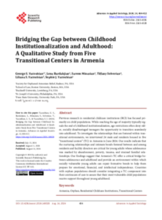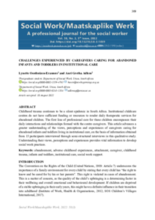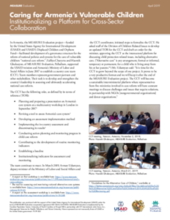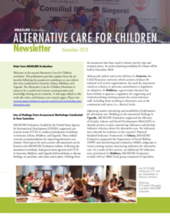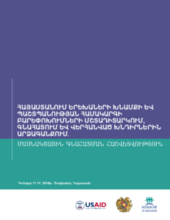childrens_living_arrangement
children_living_without_bio
Displaying 1 - 10 of 38
This study explores the role that transitional centers in Armenia play in the transitioning process of leaving institutional care and entering independent adulthood.
On 24 July 2024, the Council of Europe project “Protecting the Rights of Armenian Children in Post-Conflict Context” organised a roundtable discussion with a view to support Armenia's efforts in deinstitutionalisation reform and enhance the protection of the rights of unaccompanied and separated children.
This article advances a greater understanding of the views, perceptions and experiences of caregivers caring for abandoned infants and toddlers living in institutional care in South Africa, on the basis of information obtained from 15 participants interviewed through semi-structured interviews in this qualitative study. Understanding their views, perceptions and experiences provides vital information to develop social work practices.
"Nine children and six employees of the Marie Izmirlian Orphanage in Yerevan have tested positive for coronavirus," according to this article from Public Radio Armenia.
This dispatch from Human Rights Watch calls on Armenia to invest less in institutionalization and more in community-based services for families.
"Armenia’s top intelligence agency—the National Security Service (NSS)—has launched a criminal investigation into reports of illegal international adoptions which allegedly took place between 2016 and 2018," according to this article from the Armenian Weekly.
This brief explains the structure and roles of this country core team (CCT) established by Armenia’s Ministry of Labor and Social Affairs in June 2017 and the team’s usefulness as a platform for collaboration for the reform of national policies and systems for the care of vulnerable children: “national care reform.”
The alternative care for children newsletter provides updates following assessment workshops on care reform that were conducted in Armenia, Ghana, Moldova, and Uganda.
This report presents findings from assessments of the care systems in Armenia, Ghana, Moldova, and Uganda by system component and areas of care, and summarizes recommendations for strengthening alternative care systems.
This report, in Armenian, presents the findings of an assessment workshop aimed at bringing together key stakeholders—decision makers, policy developers, service providers, civil society representatives, and donors—to assess and identify the main care reform areas in which action is needed.

